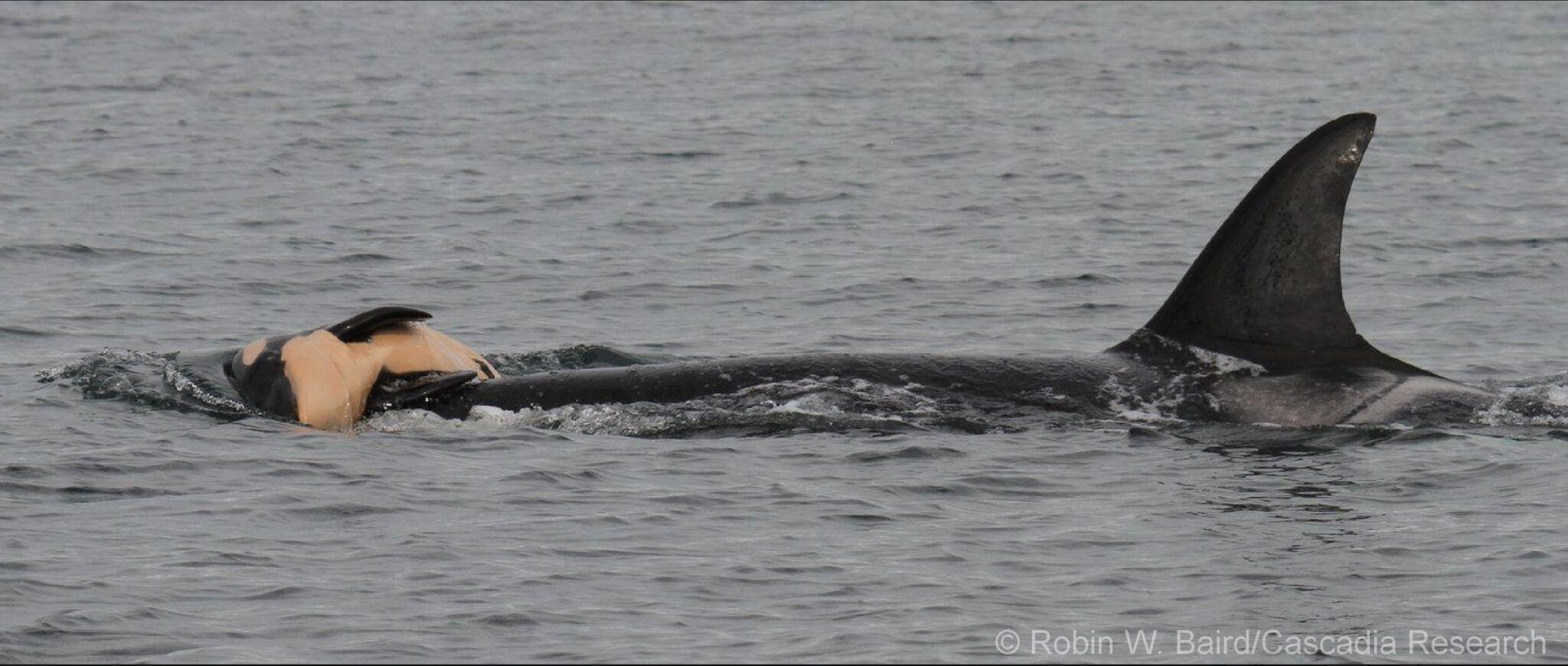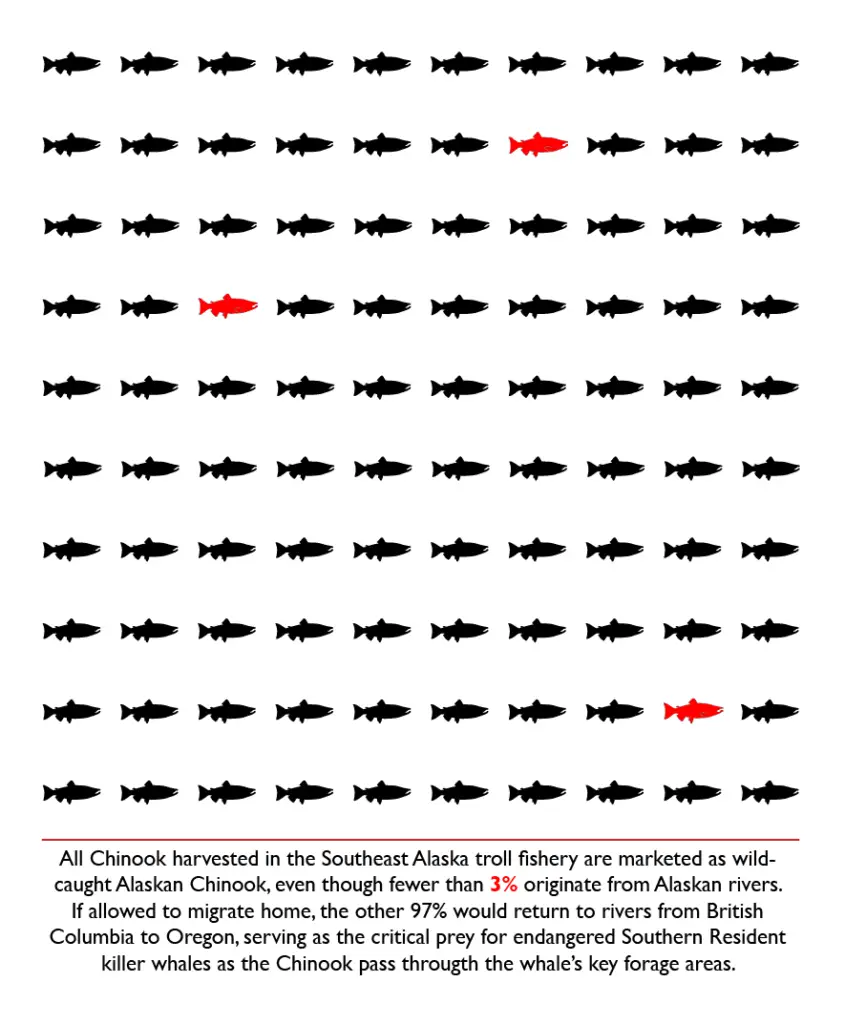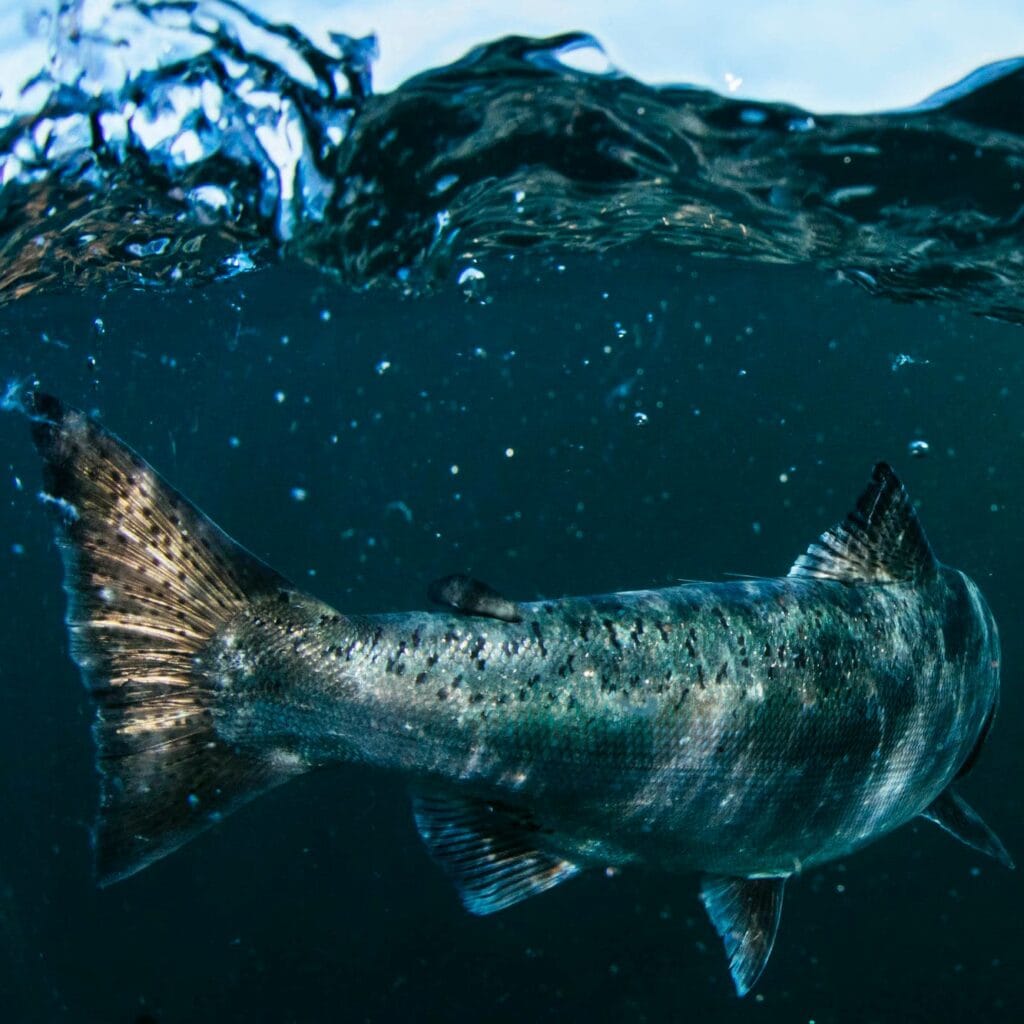
Top Photo: According to whale experts, orcas demonstrate a deep sense of mourning for their lost newborns, much like any devoted family would. In 2018,Tahlequah (J35) shown above, cradled her deceased calf on her nose for 17 days straight. Recent research has shown that 69% of Southern Resident killer whale pregnancies are aborted due to insufficient Chinook salmon. (Photo credit: Robin W. Baird/Cascadia Research Collective)
All month, communities coastwide have been coming together to celebrate the Pacific Northwest’s most iconic marine mammal, the Southern Resident killer whales. For this very reason, it is with great disappointment that we’re reaching out during the final week of ‘Orca Month’ to share a shocking court decision putting short-term economics ahead of endangered species protections for the critically endangered Southern Resident killer whale population and the threatened wild Chinook they depend on.
Read Wild Fish Conservancy’s full press release here.
This week, a Ninth Circuit Court approved a request by NOAA Fisheries, the State of Alaska, and the Alaska Trollers Association to allow commercial troll fishers in Southeast Alaska to continue over-harvesting depleted Chinook salmon, jeopardizing the recovery of both wild Chinook and Southern Resident killer whales.
The decision will temporarily pause the landmark decision we shared last month by Seattle’s federal District Court to close the Southeast Alaska commercial troll fishery in the summer and winter seasons until the federal government provides a new analysis and conducts environmental review demonstrating that the fishery’s harvest plan will not continue to push endangered Southern Resident killer whales and threatened Chinook populations closer to extinction.
The fishery was set to close in just eight days, beginning on July 1st, and would have immediately allowed the malnourished Southern Resident killer whales far greater access to these Chinook, which are the whale’s primary prey, marking a turning point for their recovery.
Now, instead of leaving the lower Court’s remedy in place while an appeal of the case is heard in the Ninth Circuit, this week’s decision will allow the fishery to continue operating throughout what may be a one to two year appeal process. In making this shocking decision, the Ninth Circuit panel determined that the economic impact to Alaska’s fishing industry outweighs the fishery’s continued ecological impact to the survival of endangered orcas and threatened Chinook.
Most concerning, the Ninth Circuit did not overrule or dispute the underlying violations and harm found by the District Court, and NOAA Fisheries is still required to correct the illegal harvest plan. As a result, the fishery is being allowed to proceed while still in violation of the ESA and therefore will continue to jeopardize the survival of both iconic species.
This is the exact opposite finding of the District Court which considered the economic disruption that closure of the fishery would pose to Alaskan commercial fishers, yet determined protecting species threatened and endangered with extinction is the greatest priority under the Endangered Species Act. Referencing existing case law, the Court’s report and recommendation stated: “The ESA . . . did not seek to strike a balance between competing interests but rather singled out the prevention of species [extinction] . . . as an overriding federal policy objective.”
“The economic, ecological, and cultural cost of losing Southern Resident orcas and wild Chinook is unfathomable.
Emma Helverson, Executive Director of the Wild Fish Conservancy
It is unfortunate that the Ninth Circuit determined the short-term economic interests of Southeast Alaska commercial harvesters should be prioritized over the long-term interests of all current and future generations of First Nations, Tribal Nations, and communities throughout the Pacific Northwest who depend on these iconic species.”
While it would have been possible to find creative solutions to compensate and protect the economic needs of these fishers in the interim while NOAA corrects their violations, it is impossible to replace Southern Resident killer whales or wild Chinook once they are gone, extinction is forever.
In NOAA’s 2019 biological opinion evaluating the fishery’s impact on threatened and endangered species, the federal agency admitted that over the last decade and persisting today, Chinook harvest in Southeast Alaska’s troll fishery is occurring at levels that are unsustainable for the long-term survival and reproductive success of both threatened wild Chinook populations and endangered Southern Resident killer whales. Still, NOAA authorized the harvest to continue at these levels relying on proposed mitigation measures they claimed would offset this serious harm. In summary judgement in August, the District Court overwhelmingly found the mitigation was insufficient to offset this harm and seriously violated the ESA. Further, NOAA began implementing the illegal mitigation while evading legally required environmental review.
While the fishery occurs in Southeast Alaska marine waters, many are often surprised to learn that the majority of Chinook harvested in the Alaskan troll fishery are not Alaskan Chinook. In fact, up to 97% of all Chinook harvested in the fishery are born in rivers throughout British Columbia, Washington, and Oregon, with roughly half of the fish harvested originating from the Columbia River and it’s tributaries. Many of these populations are listed as Threatened under the ESA and Canada’s Species at Risk Act (SARA) and majority of the stocks harvested in the fishery are identified as priority stocks for the malnourished and endangered Southern Resident killer whales. By harvesting these Chinook in their ocean nursery rearing habitats, they are prevented from reaching maturity and returning back to their homewaters where the Southern Resident killer whales encounter them.

In addition to these conservation concerns, the overharvest of non Alaskan Chinook in Southeast Alaska has persisted for decades, creating a serious inequity for communities coastwide who have closed or constrained fisheries and made significant economic sacrifices to protect threatened and endangered Chinook populations in their home rivers. While these communities invest significant time and resources in recovery efforts, these same depleted populations are being harvested far from home in Southeast Alaska where they are marketed and sold as sustainable Alaskan Chinook. We will continue to advocate for this historic inequity to be addressed in order to restore greater control to communities coastwide over the destiny of salmon recovery in their home watersheds. It is far past time for the responsibility of recovering and restoring these species to be equally shared by all communities who depend on them.
While only ~3% originate from Alaskan rivers, all the Chinook harvested in the Southeast Alaska troll fishery will go on to be marketed and sold to consumers as sustainably-certified Alaskan Chinook. This means the ‘Alaskan Chinook’ on your plate, could really be one of the few remaining threatened Chinook from Puget Sound or from the Snake River. We strongly encourage the public to avoid sourcing Chinook from the Southeast Alaska fishery, which is being allowed to move forward while operating under a harvest plan that violates the ESA.
We know this news and decision will be concerning to so many who have been following this case and working tirelessly to recover our beloved Southern Resident killer whales and wild Chinook populations. Despite this temporary setback, we cannot take for granted our enormous success to date in this legal effort and the District Court’s decision remains a landmark environmental victory. The appeal process is just beginning and we want to assure our members and supporters that we remain dedicated to advocating for the recovery of these iconic species through this legal effort and every avenue possible.

Wild Fish Conservancy is proud to be represented in this matter by Kampmeier & Knutsen, PLLC, of Portland, Oregon and Seattle, Washington and by Corr Cronin, LLP of Seattle, Washington
kampmeierknutsen.com | corrcronin.com
Further Reading:
Join our mailing list to recieve important updates on our work, the latest wild fish news, & opportunities to take action to support wild fish.
This site is protected by reCAPTCHA and the Google Privacy Policy and Terms of Service apply.
Wild Fish Conservancy is recognized as a 501(c)3 non-profit by the IRS